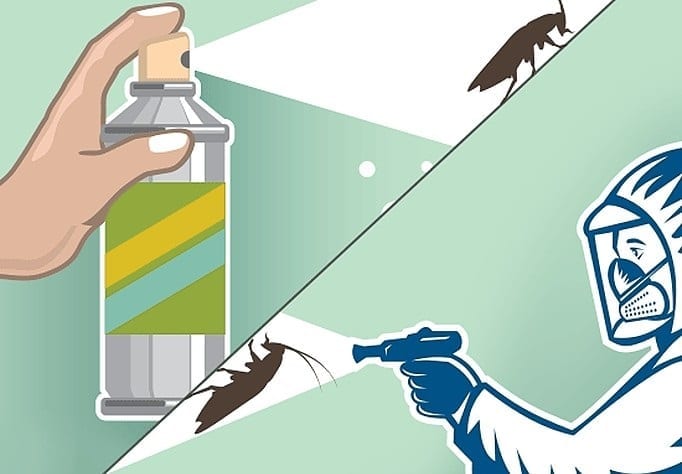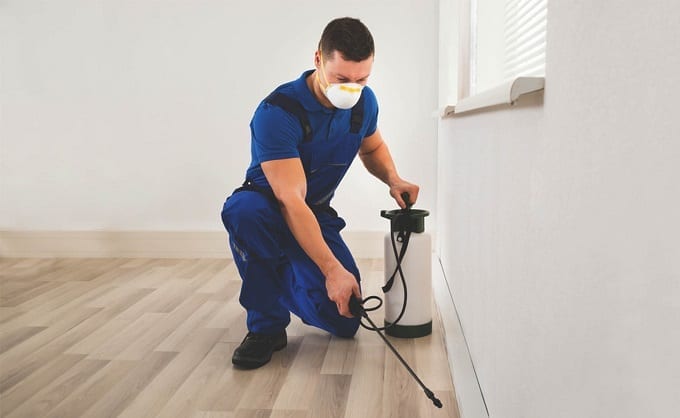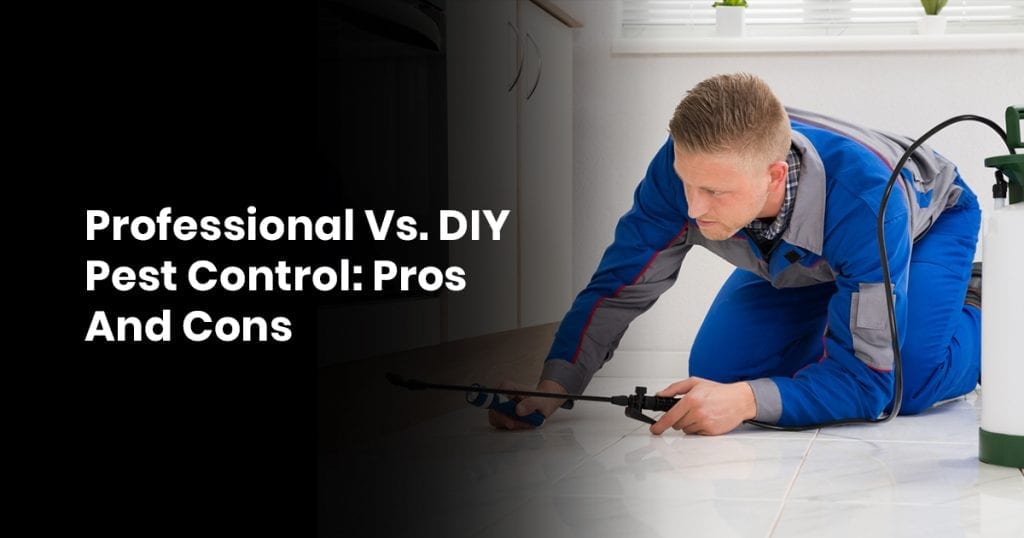At some point or another, every home will experience an influx of infestation of pests.
This could be as simple as an ant attack or something harder to get rid of like mice or other rodents, but no matter the type of home you have or how clean you keep it, you’re probably going to have to rely on pest control at every now and then.
How does professional pest control compete with DIY pest control measures, though?
The general approach of pest control, whether it’s professional or DIY, is to use a range of chemicals or devices that have been proven to eradicate pests and keep them away. Their application differs slightly depending on which avenue you take, with professional pest control usually being more expensive and DIY pest control for smaller-scale issues.
We’re going to look exactly at how these two differ and what the pros and cons are of each approach.
Pests are an unavoidable part of life and something that goes hand in hand with home ownership so knowing what each solution offers will make it easier to eradicate them if they ever become a problem.
Contents
What’s the Difference Between DIY and Professional Pest Control?

DIY pest control and professional pest control use a lot of the same methods to eradicate pests, but usually on a smaller or larger scale.
Most people use some sort of pest control themselves at home to keep insects and rodents away or trap or kill those that have infested their home, but when the problem gets out of hand then that’s when you might prefer to call in professional help.
DIY and professional pest control measures both include things like traps, chemicals, electromagnetic repellers, poisons, and fumigation to get rid of infestations.
The DIY approach is largely focused on prevention as well, so things like knowing what attracts pests and trying to avoid it or setting up small scale traps and spraying repellent can help keep things away.
The professional approach to pest control is usually needed when things get out of hand and you’re not able to control the pest problem yourself.
Sometimes they use harsher chemicals to kill off any unwanted pests or give more thorough applications when an infestation is serious, and both methods can be effective when used at the right time.
The Pros of DIY Pest Control
The first approach that most households take against pests is to do it themselves, and there is a huge range of products that give you the opportunity.
Whether it’s setting up an electronic mouse trap or spraying homemade pest repellent, these are the advantages of using DIY pest control.
Affordability

The biggest benefit of doing your own pest control is how much money you can save.
Compared to a professional approach which can cost hundreds to thousands of dollars depending on what you’re using, DIY pest control is something that every household can easily afford.
Effectiveness
Modern pest control measures for the home have never been more effective which is why many prefer to try this option first.
There are now so many methods to use at home including traps and poisons depending on what approach you want to take.
Health and safety
Being in control of what products you’re using for pest control means you can choose those that are safer for your family and pets.
Professional pest control usually relies on the harshest chemicals and methods which might not always be ideal.
The Cons of DIY Pest Control
Doing your own pest control at home has its benefits but there are also things that might make it less favorable, depending on your situation.
Consider the potential cons of DIY pest control before deciding whether it’s right for your home.
Strength of products
Although many are effective, the strength of DIY pest control products is usually not at the same level as the professional ones.
You may find that you need to apply more than is recommended or repeat the treatment more often because they’re not made to be as severe as the commercial-grade supplies.
Lack of expert knowledge
Most homeowners have a basic knowledge of pests including how to look for signs of infestation and what methods work for each type.
Without the expert knowledge that a professional has, you can’t guarantee the absolute best approach to your pest problem and may treat it incorrectly.
The Pros of Professional Pest Control
Hiring a professional pest control service is something that people usually do when they’ve been unable to solve the problem for themselves.
There are two major advantages that come with hiring an expert that can’t be achieved when you do it yourself.
Convenience

Having someone come to your home after you book the service and take care of every aspect of the pest control process from investigation to completion is a lot more convenient than doing it yourself.
Many professional services even offer complimentary follow-up visits to make sure the problem has been taken care of.
Thoroughness
The thoroughness of a professional pest control service can’t be beaten and this includes everything from the strength and effectiveness of the products they use to the expert knowledge and application that the experts have.
This thoroughness is why many people use professional pest control for serious issues.
The Cons of Professional Pest Control
There are some downsides to using professional pest control when compared to doing the job for yourself at home.
These are a couple of reasons why people prefer to try their own methods first before calling in the experts.
High cost
When compared to purchasing DIY products, hiring a professional pest control expert to come to your home and apply a range of chemicals and traps is vastly different.
You can expect to pay between hundreds and thousands of dollars for just one treatment, depending on the issues they’re dealing with.
Potential harm
The chemicals used by professional pest control services are usually quite harsh and there’s no way to know exactly what ingredients are being used unless you make a point to ask.
Households with children or pets might be especially cautious of using something so severe to treat their home.
How to Know Which Form of Pest Control is Best?
So, which one is better for your home, DIY pest control or professional pest control?
There’s no right or wrong answer and it’s simply a matter of evaluating the issue at hand and then choosing the approach that will work best.
Not all pests require expert help in removing but not all DIY products will be able to get the job done effectively.
DIY pest control methods like mouse traps, mosquito repellents, electronic magnetic devices, and insect-killing chemicals are best used as the first line of defense.
If you notice a minor infestation of ants or cockroaches or have recently found mice droppings or sighted a rodent at home, you can make an attempt to solve the problem yourself with the great selection of DIY pest control products now available.
Calling in the experts and asking for professional pest control help should only be done when the problem has gotten bigger than you can handle.
If you’ve attempted DIY solutions and found that they’re not working or the infestation of pests seems to be getting larger as time goes on, there’s no harm in calling a professional service to get their opinion on the best approach.
Most homes can live happily without pests just by using some DIY products and taking care to prevent an infestation with proper food storage and clean living.
When things get out of control though and these methods are no longer effective, having a professional pest service to solve the problem will ultimately save you time and money.
Related Questions
Pest control is something that most homes have had to implement at some time or another, whether it be DIY or professional help.
We’ve answered some popular questions people have about pest control to give you some background knowledge on how it all works.
What Chemicals Are Used by Exterminators?
To get an idea of the products used by exterminators, you can familiarize yourself with the most common chemicals they use to kill pests.
Fipronil, bifenthrin, abamectin, cyfluthrin, and hydramethylnon are some of the active ingredients found in insecticides used.
How Often Should Pest Control Be Done?
Depending on your home and what pests are currently found there, a treatment every couple of months is ideal for most households.
DIY products can be used year-round provided you follow the manufacturer’s guidelines and professional services should only be called in when there’s a need for them.

